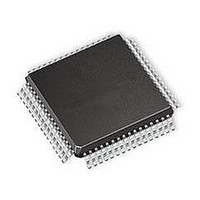PIC18F65K90T-I/PT Microchip Technology, PIC18F65K90T-I/PT Datasheet - Page 66

PIC18F65K90T-I/PT
Manufacturer Part Number
PIC18F65K90T-I/PT
Description
32kB Flash, 2kB RAM, 1kB EE, NanoWatt XLP, LCD 64 TQFP 10x10x1mm T/R
Manufacturer
Microchip Technology
Series
PIC® XLP™ 18Fr
Datasheet
1.PIC18F66K90-IMR.pdf
(570 pages)
Specifications of PIC18F65K90T-I/PT
Processor Series
PIC18F
Core
PIC
Data Bus Width
8 bit
Program Memory Type
Flash
Program Memory Size
32 KB
Data Ram Size
2 KB
Interface Type
I2C, SPI
Maximum Clock Frequency
64 MHz
Number Of Timers
8
Operating Supply Voltage
1.8 V to 5.5 V
Maximum Operating Temperature
+ 125 C
3rd Party Development Tools
52715-96, 52716-328, 52717-734, 52712-325, EWPIC18
Minimum Operating Temperature
- 40 C
On-chip Adc
12 bit, 16 Channel
Core Processor
PIC
Core Size
8-Bit
Speed
64MHz
Connectivity
I²C, LIN, SPI, UART/USART
Peripherals
Brown-out Detect/Reset, LCD, POR, PWM, WDT
Number Of I /o
53
Eeprom Size
1K x 8
Ram Size
2K x 8
Voltage - Supply (vcc/vdd)
1.8 V ~ 5.5 V
Data Converters
A/D 16x12b
Oscillator Type
Internal
Operating Temperature
-40°C ~ 85°C
Package / Case
64-TQFP
Lead Free Status / Rohs Status
Details
Available stocks
Company
Part Number
Manufacturer
Quantity
Price
Company:
Part Number:
PIC18F65K90T-I/PT
Manufacturer:
Microchip Technology
Quantity:
10 000
Company:
Part Number:
PIC18F65K90T-I/PTRSL
Manufacturer:
Microchip Technology
Quantity:
10 000
- Current page: 66 of 570
- Download datasheet (5Mb)
PIC18F87K90 FAMILY
4.7
The Ultra Low-Power Wake-up (ULPWU) on pin, RA0,
allows a slow falling voltage to generate an interrupt
without excess current consumption.
To use this feature:
1.
2.
3.
4.
5.
When the voltage on RA0 drops below V
wakes up and executes the next instruction.
This feature provides a low-power technique for
periodically waking up the device from Sleep mode.
The time-out is dependent on the discharge time of the
RC circuit on RA0.
When the ULPWU module wakes the device from
Sleep mode, the ULPLVL bit (WDTCON<5>) is set.
Software can check this bit upon wake-up to determine
the wake-up source.
See
EXAMPLE 4-1:
DS39957D-page 66
TRISAbits.TRISA0 = 0;
PORTAbits.RA0 = 1;
for(i = 0; i < 10000; i++) Nop();
TRISAbits.TRISA0 = 1;
WDTCONbits.ULPEN = 1;
WDTCONbits.ULPSINK = 1;
OSCCONbits.IDLEN = 0;
Sleep();
Charge the capacitor on RA0 by configuring the
RA0 pin to an output and setting it to ‘1’.
Stop charging the capacitor by configuring RA0
as an input.
Discharge the capacitor by setting the ULPEN
and ULPSINK bits in the WDTCON register.
Configure Sleep mode.
Enter Sleep mode.
Example 4-1
Ultra Low-Power Wake-up
//***************************
//Charge the capacitor on RA0
//***************************
//*****************************
//Stop Charging the capacitor
//on RA0
//*****************************
//*****************************
//Enable the Ultra Low Power
//Wakeup module and allow
//capacitor discharge
//*****************************
//For Sleep
//Enter Sleep Mode
//
//for sleep, execution will
//resume here
for initializing the ULPWU module.
ULTRA LOW-POWER
WAKE-UP INITIALIZATION
IL
, the device
A series resistor, between RA0 and the external capac-
itor, provides overcurrent protection for the RA0/AN0/
ULPWU pin and enables software calibration of the
time-out (see
FIGURE 4-9:
A timer can be used to measure the charge time and
discharge time of the capacitor. The charge time can
then be adjusted to provide the desired delay in Sleep.
This technique compensates for the affects of
temperature, voltage and component accuracy. The
peripheral can also be configured as a simple
programmable
temperature sensor.
Note:
RA0/AN0/ULPWU
For more information, see AN 879, “Using
the Microchip Ultra Low-Power Wake-up
Module” (DS00879).
Figure
Low-Voltage
2009-2011 Microchip Technology Inc.
4-9).
ULTRA LOW-POWER
WAKE-UP INITIALIZATION
Detect
(LVD)
or
Related parts for PIC18F65K90T-I/PT
Image
Part Number
Description
Manufacturer
Datasheet
Request
R

Part Number:
Description:
Manufacturer:
Microchip Technology Inc.
Datasheet:

Part Number:
Description:
Manufacturer:
Microchip Technology Inc.
Datasheet:

Part Number:
Description:
Manufacturer:
Microchip Technology Inc.
Datasheet:

Part Number:
Description:
Manufacturer:
Microchip Technology Inc.
Datasheet:

Part Number:
Description:
Manufacturer:
Microchip Technology Inc.
Datasheet:

Part Number:
Description:
Manufacturer:
Microchip Technology Inc.
Datasheet:

Part Number:
Description:
Manufacturer:
Microchip Technology Inc.
Datasheet:

Part Number:
Description:
Manufacturer:
Microchip Technology Inc.
Datasheet:











